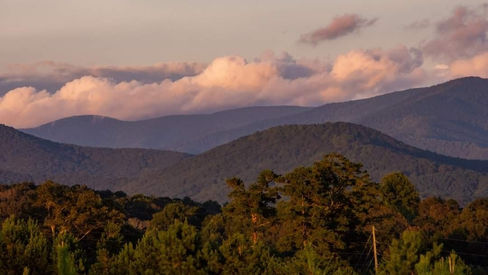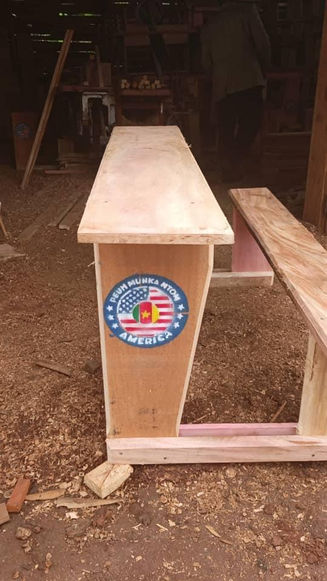
ABOUT BAMEKA 🌍

Bameka is located in the Upper Plateau Division of the West Region of Cameroon. It comprises seven villages: Djut, Kouogouo, Latsit, Meji, Bamesseng, Ngouang, and Bapeng, spread over an area of about 52 square km.
The current population of Bameka is estimated to be around 30,000 people or more.
Bameka is situated in tropical and subtropical grasslands, with a long rainy season from March to November and a short dry season from December to February. Seasonal constraints include limited access to agricultural roads during the rainy season and exposure to vector-borne diseases, particularly mosquito-spread malaria.
Although Bameka is not part of the Cameroonian volcanic mountain line, it has very fertile soil that favors agriculture, clay that supports artisanal and livelihood activities, and laterite soil for road construction.
Bameka is located on the western high plain, which is fertile, rich in water, intensely cultivated, and surrounded by a ring of hills with few pastures.
Food & Agriculture
The staple food of the Bameka people is fufu corn, eaten with nkui, a dish prepared with local ingredients and salt, but no palm oil.
The people of Bameka are known for cultivating corn, beans, peanuts, and tomatoes —with the King being one of the largest producers—as well as chicken, pig, and goat farming.

Water & Sanitation
While Bameka’s hydrology network is one of its natural advantages, access to drinking and bathing water becomes particularly complicated during the dry season. The main water station that supplies Bafoussam does not provide for Bameka, and locally made water drills are limited to privileged individuals. Public drills are poorly maintained and function irregularly.
It is estimated that only half of the population has access to clean drinking water. Most rely on untreated streams, with few able to afford household water treatment.
Besides the lack of water supply points, people lack adequate containers to transport water and frequently complain about water quality. Some households have latrines inside, others share pit latrines (with or without slabs), and some practice open defecation.
Electricity & Energy
Bameka is connected to the electrical network. However, electricity provided by ENEO is highly inconsistent, affecting households both day and night.
Nearly all households use wood for cooking on a three-stone fireplace.
Market & Economy
Bameka has a main market that opens every eight days. The main challenge is financial constraints within the population. Food is acquired through:
✔️ Self-production
✔️ Buying on credit
✔️ Gifts from others.
When unable to afford food, families reduce meal portions or the number of meals per day to ensure that children are fed first.
Other sources of income include commerce and skilled daily labor.
Cultural Heritage & Development
One of the King’s key projects is to construct a museum that will:
✔️ Promote cultural values
✔️ Bridge local and global traditions
✔️ Create job opportunities
✔️ Strengthen cultural identity.
This museum will be built using local materials, techniques, and labor. Once completed, it is expected to attract many visitors eager to see Bameka’s sculptures.
Many Bameka children living outside return home to participate in cultural events such as Kaah Ndeh Munka, a week-long festival celebrating Bameka’s traditions. During this period, people commune with their ancestors, the King performs sacrifices, and masquerades and cultural dances are showcased.
Notable traditional dances include:
✔️ Medjouong (Lahli)
✔️ Kaah Momete
✔️ Mewouop
✔️ Nkegna
✔️ Muh Nteuh
✔️ Djimassa
✔️ Kouodjang
✔️ Samali
✔️ Kouakoua.
📌 Click on the links to learn more about:

Education
Bameka has several educational institutions, including government-owned, private, and denominational schools:
✔️ 11 Kindergartens
✔️ 17 Elementary Schools
✔️ 4 Middle & High Schools.
With consistent high success rates in national exams, Bameka is regarded as a seat of wisdom in the Upper Plateau Division. This success is due to the efforts of the Bameka diaspora, who support extra classes and provide scholarships to intelligent but disadvantaged youth.
We also offer mentoring programs that prepare young people for vocational and skill-based training, ensuring better job opportunities.
Health
There are seven (7) health institutions in Bameka:
-
The District Medical Center of Djut
-
The Bamesseng Integrated Health Center
-
The Nket Integrated Health Centers
-
The Saint Marie MUNDA Center
-
The Jonas Lowe Mother and Child Care Center
-
The Wetsing Foundation
-
The Njouong Private Health Center.
Religion
Religion in Bameka is a mix of traditional beliefs (including ancestor worship, animism, and paganism) blended with Christianity (mainly Evangelical, Presbyterian, and Catholic).
The King is the traditional ruler, acting as both the head of traditional government and the chief religious authority, ensuring that the ancestors remain pleased. He is supported by seven notables, known as the Mekam Sahmba.

The 20 Kings Who Have Ruled Bameka
20. Fô Tàkûkǎm Jean-Raymond
19. Fô Chyìndə́ Samuel
18. Fô Pɔ̀'kám Mbʉ̂kɔ́ Frédéric
17. Fô Tàmbɔ́ Felix
16. Fô Mbʉ̂kɔ́ Michel
15. Fô Tàkûkǎm II mbɛ̀ ténə̀ kǔgùm
14. Fô Fø̀gâŋ
13. Fô Fòtsíŋ
12. Fô Fø̀ŋkǎm
11. Fô Pamə́kwɔ̀ŋ
10. Fô Tàkûkǎm
9. Fô Tagatha
8. Fô Nguepongwa
7. Fô Kemtchewet
6. Fô Tsìŋ ténə̀
5. Fô Ŋkàh njò II
4. Fô Nɔ̀ŋgwɔ̀ŋgwɔ̀ŋ
3. Fô Ŋkàh njò i
2. Fô Jwɔ̂ŋvǿ
1. Fô ŊKàh
Our Concerns!.....
Be proud of our origins
Preserve our identity
Stay committed to our traditions and cultures
Promote solidarity among our members
Actively participate in the life of our host country
Contribute to the development of our original community

Our Priorities!....
Bring together all BAMEKA nationals in the USA
Ensure the stability and proper functioning of the Association
Promote fraternity and solidarity within the Association
Implement programs likely to contribute to the economic and sociocultural development of BAMEKA
Collaborate with other organizations or associations with similar objectives or interests

Our Ambitions!....
Establish a genuine structure for mutual assistance, solidarity, and sociocultural expression among BAMEKA nationals in the United States;
Found our Association on the principles of Fraternity, Honesty, Self-Respect, and Respect for Others, principles that have always governed the lives of our people;
Translate into practice the slogan that so aptly defines our Association;
Get to know each other to live better together.

EXECUTIVE MEMBERS

Mr. Gerard Martin Siegha
Head of the Community

Mrs. Sandrine Tuekam K.
Private Secretary

Mr. Victorien Singhe
Protocol & Security Officer
_edited.jpg)
Mr. Philippe Munkam
Special Advisor

Mrs. Thérèse Yonzo
Special Advisor

Mr. Gabriel Njonjo
Special Advisor
ACHIEVEMENTS
Chers membres de notre Communauté,
Nous sommes heureux de partager avec vous l'incroyable nouvelle de la remise d'un don de 1000 tables bac aux établissements secondaires du Groupement Baméka.
Cet événement marquant a été honoré par la présence de personnalités influentes telles que Sa Majesté Takoukam Jean Raymond Chef supérieur Baméka, le président du Comité de développement de Baméka Papa Foka Lucas, ainsi que le Chef de la Communauté Baméka aux États-Unis, Sa dignité Martin Siegha, et de nombreux notables, Chefs d'établissements, enseignants et élèves.
Nous souhaitons exprimer notre profonde gratitude envers tous ceux qui ont contribué de manière directe ou indirecte à la réussite de cet événement exceptionnel. Nous tenons à remercier chaleureusement les élèves, les enseignants, les chefs d'établissements, les notables et tous les participants pour leur présence lors de cette journée mémorable. Une mention spéciale est adressée à Sa Majesté Takoukam Jean Raymond Chef supérieur Baméka pour son engagement indéfectible en faveur de l'éducation des jeunes de Baméka.
L'association Peuh Munka Ntom America salue l'ensemble des acteurs impliqués et se félicite de pouvoir compter sur une communauté aussi engagée et bienveillante. Votre soutien continu constitue un pilier essentiel dans la réalisation de notre mission commune.
Ensemble, nous bâtissons un avenir prometteur pour la jeunesse de Baméka.
Bien cordialement.
𝑫𝒆𝒏𝒊𝒔𝒆 𝑵𝒈𝒐𝒌𝒐
secrétaire général
C’était le 11 octobre 2024 à Bameka








